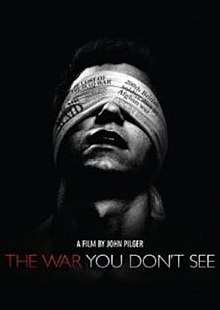The War You Don't See
| The War You Don't See | |
|---|---|
 Theatrical Poster | |
| Directed by |
|
| Produced by |
|
| Written by | John Pilger |
| Starring | |
| Narrated by | John Pilger |
| Music by | Sacha Puttnam |
| Cinematography | Rupert Binsley |
| Edited by | Joe Frost |
Production company |
Dartmouth Films |
Release date |
|
Running time | 97 min |
| Country | United Kingdom |
| Language | English |
The War You Don't See is a 2010 British documentary film written, produced and directed by John Pilger with Alan Lowery, which challenges the media for the role they played in the Iraq, Afghanistan, and Israel/Palestine conflicts. The film, which went on nationwide general release on 13 December 2010, had its premiere at the Barbican and was aired through Britain's ITV1 on 14 December 2010[1] and later through Australia's SBS One on 10 April 2011.[2]
Participants
- Professor Stuart Ewen – media historian
- Professor Melvin Goodman – former CIA analyst
- Dan Rather – CBS Evening News anchor and managing editor, 1981–2005
- Bryan Whitman – US Assist. Secretary of Defence
- Rageh Omaar – BBC world affairs reporter, 2000–2006
- Dahr Jamail – journalist & author, Beyond the Green Zone
- David Rose – former Observer journalist
- Steve Rendall – Fairness & Accuracy in Reporting
- Fran Unsworth – BBC Head of Newsgathering
- David Manion – Editor in Chief, ITV News
- Mark Curtis – historian & author, Web of Deceit
- Phil Shiner – Public Interest Lawyers
- Guy Smallman – war reporter & photographer
- Carne Ross – British Foreign Office, 1989–2004
- Professor Greg Philo – Glasgow University Media Group
- Cynthia McKinney – former US Congresswoman
- Julian Assange – Editor in Chief, WikiLeaks
Reception
The Guardian film reviewer Peter Bradshaw states that, "The force of his film is in its contention that the colossal scale of civilian casualties is, within the grammar of news, downgraded in importance so that it doesn't figure as news at all, but as all-but-invisible deep background to be ignored". "Pilger gives due respect to WikiLeaks," he concludes, "although his praise for al-Jazeera's independence is ironic, given that WikiLeaks has just revealed the possibility that the Qatar government is manipulating the channel."[3]
The Guardian television reviewer John Crace states that, "Pilger has never traded in anything other than black and white," and "Pilger's starting point is that all governments are shysters whose only interest is economic and all journalists are witless dupes," which, "had the feel of slight overkill," but "For all his lack of subtlety, he presents his case with passion and conviction." "What shone through," he concludes, "was that those we rely on to think clearly in times of war are often those most seduced by myopic machismo and that any sense of history gets instantly forgotten."[4]
John Lloyd wrote in the Financial Times that Pilger asserted the UK and US tried to advocate that "wars were noble, should be fought, and that death for one’s country was both sweet, and right".[5] Lloyd thought that individuals disagreeing with Pilger's interpretation were "ruthlessly marshalled into a narrative that gave them no quarter" and that by juxtaposing "two strongly put points of view" those watching "could have made up" their own minds. According to Lloyd, Pilger "showed, in his demolition of propaganda – which is what he calls government statements or politicians’ arguments – the mastery of the propagandist arts".[5]
Total Film reviewer Tom Dawson describes the film as a, "timely, potent doc," with, "an impressive range of interviewees, including 'embedded' war correspondents and whistleblowers," but concludes that, "it's the leaked footage of a US chopper attack on unarmed Baghdad residents that proves the film’s most disturbing scoop."[6]
References
- ↑ "The War You Don't See". Dartmouth Films. Retrieved 2010-12-20.
- ↑ "SBS Documentary Index: The War You Don't See". SBS Television Online. Retrieved 2011-03-31.
- ↑ Bradshaw, Peter (2010-12-09). "The War You Don't See - Review". The Guardian. Retrieved 2010-12-20.
- ↑ Crace, John (2010-12-15). "TV review: The War You Don't See – Pompeii: Life and Death in a Roman Town – Beautiful Equations". The Guardian. Retrieved 2010-12-20.
- 1 2 Lloyd, John (17 December 2010). "Polemic in the hands of a master propagandist". Financial Times. Retrieved 22 April 2017.
- ↑ Dawson, Tom (2010-12-20). "The War You Don't See". Total Film. Retrieved 2010-12-20.
External links
- John Pilger: Why are wars not being reported honestly? by John Pilger in The Guardian (10 December 2010)
- Listening Post: Interview with John Pilger on AlJazeera (23 December 2010)
- The War You Don't See at AllMovie
- The War You Don't See on IMDb